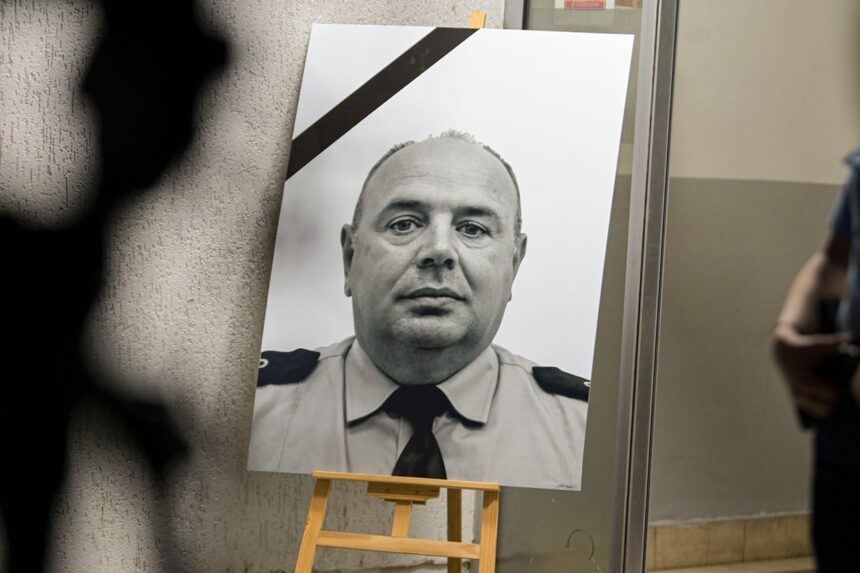Today marks two years since the terrorist attack in the village of Banjska, Zvečan, where an armed group led by chief terrorist Milan Radoičić ambushed the Kosovo Police, resulting in the death of police officer and hero of Kosovo, Afrim Bunjaku.
Five days after the attack, on September 29, Radoičić claimed responsibility. He is believed to be residing in Serbia.
According to the indictment raised against him and 44 others, Radoičić is described as the “leader of the terrorist group.” On September 24, 2023, at 01:00 a.m., after blocking the road at the village bridge with two trucks and then hiding, they attacked Kosovo Police officers who had arrived to remove the trucks and clear the road.
During the attack, officer Afrim Bunjaku was killed, officer Alban Rashiti was wounded, and several others — Çlirim Shaqiri, Mirsad Kryeziu, and Sedat Dushi — were injured.
The assault lasted until 3:00 p.m., “when the overwhelming majority of the group escaped through mountain roads toward the Republic of Serbia.”
The indictment states that the attackers were “professionally trained” and had entered Kosovo illegally from Serbia using mountain routes and dozens of vehicles, “some of them armored and loaded with heavy weapons, ammunition, rocket launchers, explosives, military camouflage uniforms, and logistical equipment.”
From January 1, 2017, until September 24, 2023, Radoičić is alleged to have obtained indirect income, much of which was used for heavy weaponry, military uniforms, logistics, and payment for members of the group.
Part of this income, according to the indictment, came from “criminal activity through cooperation and assistance from defendant Radulle Stević — owner and responsible person of the companies RAD D.O.O. and Radulle Stević B.I.”
The funds were allegedly converted into movable and immovable assets, some of which were transferred to third parties to hide or disguise their source.
What Does the Indictment Reveal?
The indictment provides detailed accounts of how the attack and the murder of Sergeant Afrim Bunjaku unfolded.
Eight Kosovo police officers who were first on the scene in Banjska testified that around 2:00 a.m. on September 24, 2023, they noticed the roadblock at the village entrance.
Officer Alban Rashiti explained that they saw the trucks blocking the road while returning from the Izvor border point. After spotting the barricades, Rashiti and his colleagues were instructed to check other roads for possible blockades.
Soon after, additional units from the Zvečan police station were dispatched toward Banjska.
“The Command Center informed them that extra units had been sent to the scene and instructed them to stay on location, take photos of the blocked trucks, and send them,” the indictment notes.
After about 20 minutes, reinforcement units arrived — among them Sergeant Afrim Bunjaku.
Bunjaku and another officer approached the trucks when suddenly an explosion occurred.
“At that moment, it was noticed that Sergeant (Afrim Bunjaku) had collapsed on the ground,” the indictment says.
Officer Çlirim Shaqiri recalled trying to pull Bunjaku to safety after the explosion.
“He approached him and saw that his wounds were in the neck area with severe bleeding,” the indictment states, but Shaqiri was unable to move him due to the heavy gunfire.
Shaqiri attempted again using a police vehicle, but “the attackers fired at the vehicle, disabling it. He was trapped inside due to the intense gunfire.”
Bunjaku was later evacuated in another vehicle and transported to South Mitrovica.
Outnumbered and under heavy artillery fire, Kosovo Police initially attempted to withdraw, but reinforcements, including armored vehicles, soon arrived.
The clashes lasted several hours. Kosovo Police were able to respond effectively until the end of the assault thanks to the reinforcements.
The prosecutor concludes that due to the high level of danger and consequences of these crimes, “our legislation foresees severe punishments, and therefore we propose the court consider them in sentencing the defendants.”







